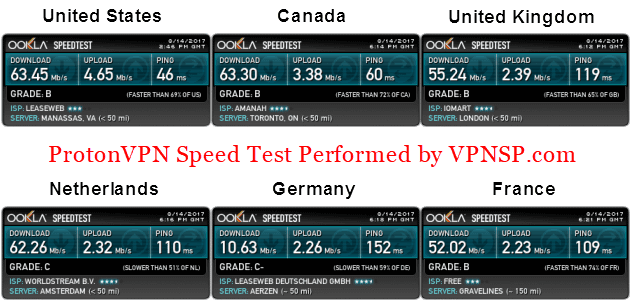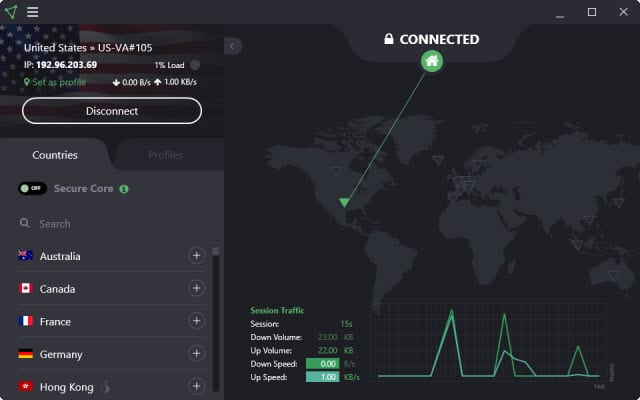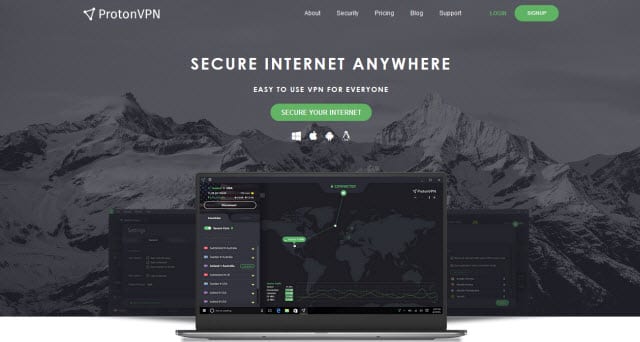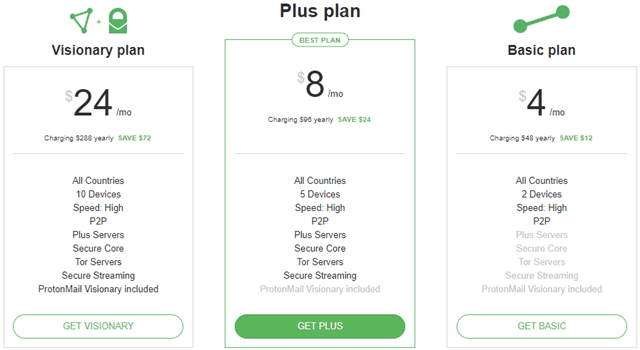As you might suspect, ProtonVPN is being offered by the same team that manages ProtonMail. The Swiss privacy service is best known for their encrypted email service. They are now expanding into VPN protection. There are a few features that help the VPN service stand out. The first being a feature called “Secure Core” which adds a double hop through a server in Swewden, Iceland, or Switzerland before connecting to an endpoint in the US, UK, Canada, Germany, Netherlands, Spain, France, Hong Kong, Australia, or Japan. This adds another layer or privacy protection.
ProtonVPN Plans and Pricing
When it comes to plans and pricing, ProtonVPN gives you a few options to choose from. For starters you can subscribe on a monthly or annual basis. A yearly sign up will save you 20% off the regular monthly price. ProtonVPN offers multiple plans depending on your needs. Let’s start by taking a closer look at the number of supported devices and VPN features you can expect to have access to with each account type.
The main difference between the ProtonVPN plans comes down to the number of supported devices, countries that you can access through their network, speed, and premium features. You can easily see the number of connections (devices) with each account. Here’s a brief overview of the features offered with the top accounts.
- Plus Servers – access to additional VPN servers with higher bandwidth for the best performance.
- Secure Core – double hop through a second VPN server to ensure a higher level of privacy. This will slow your connection quite a bit so we only recommend it for those who need the extra layer of privacy protection.
- Tor Servers – route your online traffic through the Tor network.
- ProtonMail Visionary – encrypted email with advanced features.
It only takes a minute to sign up for ProtonVPN. We understand that the VPN service originally required that you register for a free ProtonMail account to sign up. That isn’t the case anymore. You can use any email address to subscribe. Payment options include credit card and PayPal. We’re hoping the team will add Bitcoin payments in the future.
Try ProtonVPN for Free
The team at ProtonVPN launched with a free account to give new users a chance to test the service. In the past they have instituted a waitlist for free access. We’re excited to share that you can now sign up for free access without any wait. Given the limitations on the free account, we would still recommend signing up for a month of Basic or Plus access to test the service.
Those lucky enough to get a free ProtonVPN account will have access to a limited number of VPN servers in the United States, Netherlands, and Japan. Speeds are limited and the servers were at a high load during our testing so you can expect slower connection speeds. You can upgrade to a paid account to access the service on more than one device and for access to faster servers in other countries.
In addition to a free account, the ProtonVPN team offers a 7 day Proton Plus free trial. This account is automatically activated once you download the client and log in for the first time. This means you will have 7 days to try all the features of the paid service for free.
VPN Server Locations
ProtonVPN hosts servers in over 40 countries around the world. Free users only have access to 3 countries, while paid members can access 550 servers in 40 countries. Plus and Visionary members have access to a wider range of “Plus Servers” which is recommended for better performance. Let’s take a look at the server locations with free and paid accounts.
- Free accounts – Japan, Netherlands, United States
- Basic, Plus, Visionary – Austria, Australia, Belgium, Brazil, Canada, Czechia, Denmark, Finland, France, Germany, Hong Kong, Iceland, India, Ireland, Israel, Italy, Japan, Korea, Luxembourg, Netherlands, New Zealand, Norway, Poland, Portugal, Russia, Singapore, South Africa, Spain, Sweden, Switzerland, United Kingdom, United States.
- Secure Core (double hop) – Canada, UK, or US via Switzerland. Germany, Spain, or France via Iceland. Australia, France, Hong Kong, or Japan via Sweden.
The secure core servers will send your traffic through a server in Switzerland, Iceland, or Sweden before reaching the endpoint server. This doubles the encryption and helps protect your privacy. You can expect speeds to be slow but the added level of privacy is worth the performance hit for some users.
Security and Privacy
The ProtonVPN service uses AES-256-encryption with 2048-bit RSA for key exchange. Message authentication is done using HMAC with SHA256. Unlike many other VPN providers, ProtonVPN only uses the OpenVPN protocol. What does all of this mean? The service may not be as easy to configure on some devices, but you can expect a higher level of encryption from ProtonVPN than you would from services that support less secure protocols like PPTP and L2TP/IPSec.
There are some other privacy-related features that help ProtonVPN stand out in the crowded VPN industry. For starters the service is headquartered in Switzerland which is known for strong privacy laws. They have hardened datacenters in Switzerland, Iceland, and Sweden to route the “Secure Core” traffic through before landing in countries with weaker privacy protection. The service also let’s you route all your traffic through Tor servers that are available via the VPN client. The software will protect you from DNS leaks and kill your Internet connection anytime the VPN disconnects for any reason.
We normally look in the privacy policy to see what information a provider tracks. You can do the same for ProtonVPN, but first consider the country they are based in. Switzerland has very strong privacy laws. Under Swiss law, ProtonVPN is not required to save user connection logs. They can not be forced to log specific users actions on their network. That should give users a good feeling since most the industry is run by companies in less privacy-friendly countries.
Customer Support
ProtonVPN has a support page with general information and guides to help you get the service set up on Android, iOS, Linux, and DD-WRT routers. They also have instructions for accessing the Tor network with the client. You will find answers to common connection issues in a troubleshooting section of the support area. If you still have issues the support team is available. You can submit a request via their website.
ProtonVPN Speed Test
We signed up for a Plus account so we could experience the best possible performance for the review. This means that we had access to servers that are not available to members who sign up for the Basic plan. With this in mind, consider that our baseline speed without VPN is around 67-70 Mbps. As you can see below, ProtonVPN performed quite well with download speeds over 60 Mbps in the US, Canada, and The Netherlands.

As you can see above we were able to achieve a download speed of 63.45 Mbps to a server hosted just outside Washington, DC. That compares favorably with other leading VPN providers. The European server locations are thousands of miles from our location in the US. Even so, we were able to achieve a download speed of 62.26 Mbps to a server hosted in Amsterdam. The only server location we tested that didn’t meet our expectations was Germany where our speed was only 10.63 Mbps. Otherwise the ProtonVPN network performed very well.
VPN Client Apps and Compatibility
ProtonVPN launched in 2017 and has since developed a full range of VPN apps for Windows, MacOS, Linux, Android, and iOS. The desktop apps use OpenVPN while the Android and iOS apps use IKEv2 which is the preferred protocol for mobile apps now a days. You will find tutorials Tunnelblick, DD-WRT routers, and other alternatives.
ProtonVPN Windows Client in Action
The ProtonVPN client for Windows is very well designed considering it is the first software release for a new VPN service. We were very impressed by the user interface and ease of use. You can easily connect to any server location. Turning on the “Secure Core” option will change the server availability to show the double hop locations. This will route your traffic through Sweden, Iceland, or Switzerland, before passing to endpoints in less privacy-friendly countries.

There is a settings tab in the app that will allow you to start the VPN with Windows, start it minimized, and auto connect when the app launches. You can also enable the VPN kill switch feature. This will kill your network connection anytime the VPN drops for any reason. It will resume once the VPN reconnects.The client automatically offers DNS leak protection so you don’t need to turn on this feature. The default protocol is OpenVPN (UDP) which provides a good mix or privacy and performance. You can change it to TCP which adds error checking. We only recommend this if you’re having connection issues. Otherwise it will slow down your connection unnecessarily.
ProtonVPN Review : Conclusion
We enjoyed testing the new ProtonVPN service. Their ProtonMail encrypted email has a great reputation so we knew to expect a privacy-focused VPN. To that end we were not disappointed. The VPN service ensures your security by encrypting all data that passes through their network using OpenVPN (desktop) or IKEv2 (mobile). Being based in Switzerland gives ProtonVPN members an extra level of privacy protection. Advanced features including VPN kill switch protection, Server Core double hops and Tor Servers are icing on the cake.
There were very few areas of ProtonVPN that we found less than stellar but they were overshadowed by the strength of the service. Speeds were slower than normal when connected to servers in Germany. Otherwise the network was very fast across North America and Europe. The service is priced on the higher end of the industry but you receive some extra privacy features along with the reputation of the ProtonMail team. We recommend giving ProtonVPN a try and look forward to watching the service continue to evolve.



